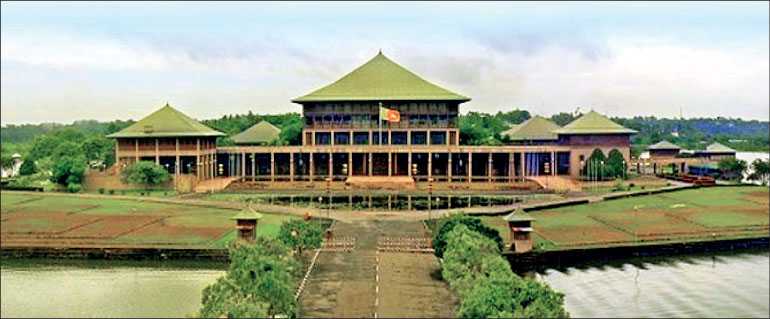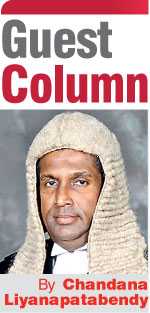Tuesday Feb 24, 2026
Tuesday Feb 24, 2026
Wednesday, 27 May 2020 00:00 - - {{hitsCtrl.values.hits}}

Parliament of sri lanka
The term of the Parliament is five years. Mere expiry of the said period of five years shall operate as the dissolution of Parliament (Article 62(2)), in which instance there is no involvement of a president or a proclamation. The drafters of the Constitution were careful enough not to require the intervention of the office of the president in such event, by requiring the president to make a formal proclamation declaring that the Parliament is dissolved. 
However, when considering the provisions of Section 10 of the Parliamentary Election (PEA) Act 1 of 1981, even in such instance, the somewhat similar thing is required: an Order from the President requiring the holding of the election.
In the other two instances (where the president is empowered to dissolve the parliament a) where the 2/3 of the parliament requires the president to do so or b) where the president himself dissolves it acting under proviso to Article 70(1) of the Constitution), the president must make a formal proclamation.
However in both such instances the provisions of Section 10 of PEA, onwards shall apply and the election process shall be proceeded with, which is now hampered due to the COVID-19 pandemic and not on any other reason. The independent Election Commission has changed the date to stand as 20 June.
However the Election Commission has now decided that it cannot hold the election even on the said subsequent date to which it was postponed by them.
At a time when the scheduled parliamentary election cannot be held due to the outbreak of COVID-19, resulting that the new parliament cannot be summoned to meet within the stipulated period of three months, and in the absence of any Constitutional provisions that even remotely suggests that the original Proclamation is ‘per se’ annulled and that the old parliament which was dissolved can thus be re-summoned, which is, as per the express provisions that contained in the Constitution, left to the president’s prerogative, who is duty bound to ensure that the Constitution is respected and upheld, to summon, prorogue and dissolve Parliament (Article 33(2)(b)), a new issue has thus arisen.
In such circumstance, the President who issued the previous Proclamation, among other things, fixing the date of the election and fixing a date for the first meeting of the new parliament, is empowered, as provided for in Section 18 (read with section 4) of the Interpretation Ordinance, to issue a fresh Proclamation, amending, varying, rescinding the original Proclamation, in which event the President may fix new dates for said same acts.
However, in such event there can be another argument stating that the President also can, acting under the said same provisions, revoke the previous Proclamation and to issue a fresh proclamation contemplating all the purposes.
Due to the intervention of three months period envisaged in Sub Article 5 of Article 70 of the Constitution, probably this may be a fit question that the President could ask the Supreme Court to express its considered opinion, invoking its consultative jurisdiction, as provided for in Article 129 of the Constitution.
That may be the way out.
(The writer is a President’s Counsel.)